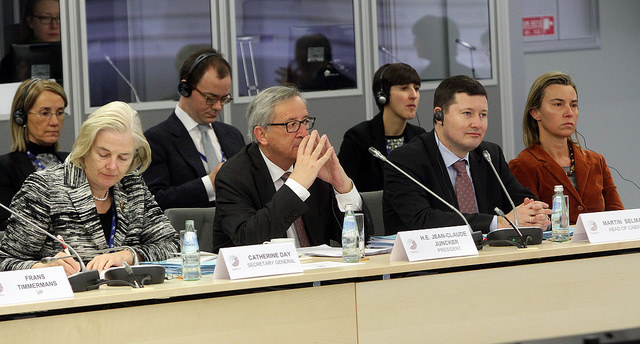Latvia’s six-month presidency of the Council of the European Union comes at “a critical time for Europe”, according to Jean-Claude Junker, President of the European Commission. In his visit to Riga on 7 January, Mr Junker welcomed Latvia’s Presidency and the country’s priorities for the upcoming semester: raising competitiveness, creating a strategy for the Digital Single Market and strengthen the EU’s foreign and security policy. These priorities will guide discussions at the 1500 odd meetings scheduled for the first half of 2015. Latvia’s EU Presidency will likewise be marked by a crucial Summit held next May in Riga with Ukraine, Belarus, Moldova, Georgia, Armenia and Azerbaijan.
There are three main issues Latvia will have to tackle.
First, the EU has not yet overcome its economic woes and growth remains sluggish at best. Many EU citizens are still struggling to cope with the consequences of the economic crisis. The Baltic state’s own successful (but painful) experience to recover from the financial meltdown could be of use to others. But given the usual time constraints of the six months Presidency, Latvia’s ambitious plan to promote competitiveness will most probably have to limit itself to supporting the pan-European investment Plan proposed by the European Commission.
Second, EU Russia relations are going through a rough time. Moscow’s annexation of the Ukrainian peninsula of Crimea in 2014 marked a turning point. Since the sanctions war began between the EU and Russia last year, the EU has lost its third largest commercial partner and €206 billion worth of goods imported from Russia. Latvia has deep ties with Russia. A third of its citizens are ethnically Russian. Trade with Moscow is crucial for Latvia, which hosts a major transfer point for coal from Siberia. Last year Latvians, whose jobs were the first to suffer from the reduced trade between the EU and Russia, called for the two parties to lift their sanctions. The Baltic country is expected to work towards easing the crisis with its eastern neighbor. Therefore, its new EU leading position may give Latvia more weight in discussions with Russia, just as it may give the EU the opportunity to de escalate the Ukrainian crisis.
Third, Latvia will be presiding over the first half of the EU’s Development Year. The rotating Presidency of the EU Council will have a chance to shape the EU’s position in the Post 2015 international development agenda. With €55.2 billion in aid money given to end poverty in developing countries in 2013, the EU, together with its member states, is the largest donor of aid to developing countries. But after 2015, aid will have to be guided by the new global climate deal scheduled for December 2015, and so far, the EU’s presence has been weak in global climate negotiations. As the third biggest emitter of greenhouse gases, the EU only managed to announce a loose plan to reduce its emissions by 2030 with 40% less than in 1990. The European Year of Development is set to help the EU towards securing its global leadership in sustainable development, by raising awareness on the importance of Europe’s aid towards developing countries and gaining support for aid spending at home.
In critical times, agenda shaping can be decisive. And this is just what Latvia’s role will be for the next six months.



